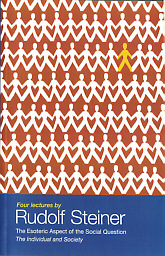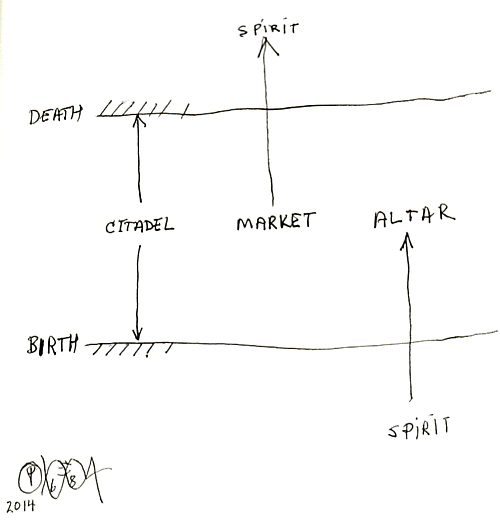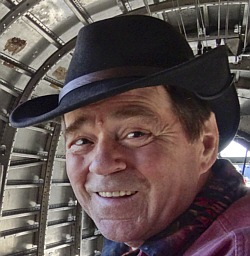With these thoughts as prologue, we are better prepared to understand what Steiner refers to in the
next passage as "the whole of humankind".
[page 19] Let us look at the social problem as one that affects the whole of
humankind. However, to us the whole of humankind is not only the group of souls
who come together socially on earth at a particular time but also the sum of all those
souls who at the same time are in the supersensible world, are connected by spiritual
ties with earthly human beings and belong to what we can call the whole of the
human race. Let us look first of all at what we call in an earthly sense our human
spiritual/cultural life.
Biologists and other scientists who study only the material world would have us believe that
consciousness, like life itself, is something that arises from humans as a vapor from our material body, like
steam rising from the rocks in a sauna. The truth is the opposite; life and consciousness arise in us through
the actions of spiritual beings from the very beginning of our Cosmos until now(1). It is not surprising then
that all aspects of the social question, religion, arts, laws, and morality should be thought by the same
scientists to arise out of our everyday reality. Once again, they have understood the reality of humankind
backwards.
[page 20] The working class world view today is namely the following: Everything in
the nature of religious conviction and dogma, artistic achievement and legal or moral
views, is a superstructure, a kind of spiritual vapor arising out of the only true
reality, economic reality. Spiritual life is made into an ideology, into something that
is merely in the imagination. To those people, however, who are aware of the
foundations from which anthroposophical spiritual science springs, the cultural life
in which human beings are embedded is in itself a gift from spiritual beings. They see
it not as rising up as clouds out of the depths of economic life but as streaming down
from the life of the spiritual hierarchies.
We would do best, when we encounter the social realities, to ask "What is living in it?" Steiner tells
us on page 23. The answer we will receive with a serious study of spiritual science is that spiritual beings
live in it.
[page 23, 24] If we can become sensitive enough to feel such reverence for the
spiritual world surrounding us that we recognize it to be what the spiritual beings
themselves are giving us and surrounding us with, then we shall be able to be truly
grateful for this gift from the supersensible world which we experience as our earthly
spiritual realm of culture.
In Spencer Heath's fine book, Citadel, Market, and Altar, I first encountered the concept of three
folds of society which are listed in its title. The Altar was how Heath referred to what Steiner calls above,
"Our earthly spiritual realm of culture." Culture is something we experience during our time in a physical
body on Earth, but is spiritual in essence. It involves all areas of social interaction not connected with the
Citadel (laws) and the Market (economic life).
The second area or Citadel is delineated by Steiner this way:
[page 24] The second area of the social structure is what we could call the
administrative rights state, strictly speaking the political life, the area relating to the
ordering of juristic relationships between one person and another, of those things in
which everybody should be equal before the law. This is the actual life of the state.
And fundamentally speaking the life of the state should be nothing else but this. . .
. This life, this actual life of the state is the only area within the social organism which
has nothing to do with the life before birth or the life after death. This is an area that
finds the bearings for all its rulings solely in the world human beings live in between
birth and death. The state is true to its own nature only when it does not contain a
single element that participates in the supersensible realm, whether in the direction
of birth or of death.
The Citadel is the only fold of the threefold social structure which has no connections with the two
enigmas: what happens before birth; what happens after death. Curiously, Steiner shows that the Market,
the economic fold of society, is connected with the after death enigma. He says, in this next passage, there is a person inside you who makes plans during your time between death and a new birth, plans for your next life prior to your being born, and Steiner calls this person "the more profound human being inside you." (Page 28) This is the same profound person in
you who is directly involved during the time between birth and death making economic decisions,
decisions which are never quite completed at death and carry over into the spiritual world with us and thence into our next lifetime.
[page 28] Thus specifically those perceptions or impulses we acquire in economic life
have a stronger connection to our life after death than people imagine.
Briefly put, if we cannot pay off an incurred obligation before we die, it tops the agenda of that
profound person inside us who will arrange for us to balance that obligation in our next lifetime on Earth.
Let us attempt to get the three aspects of the social function down pat. First, the Market and Altar
portions. Steiner helps us by pointing out how each human being is a threefold being. As a child we come
into this world carrying the ability to see our previous lifetime via a native clairvoyance which disappears
before we have formed declarative memory with which to remember it, but vestiges of this childhood
reality feeds forward into our adult Altar life and fills us with an attraction to our cultural life of art,
religion, learning, etc. During our daily Market interactions with others as adults we create something in
ourselves which is etheric and feeds forward into our next lifetime on Earth.
[page 33] It should be of the greatest possible interest and significance to everyone
endeavoring to deepen their lives by means of anthroposophical spiritual science to
reach the recognition that this threefold ordering of the social organism is based on
the very fact that a human being is similarly a threefold being. As a child growing
into the physical world we still bear traces of our pre-birth experiences; we have
qualities that belong solely to this life between birth and death; and beneath the veil
of ordinary physical life, as it were, we are already preparing what will come into its
own in the supersensible realm after death. What appears to be the lowest level of life
here, the physical handling of the economy — seemingly lower from our earthly point
of view than the life of rights — redresses the balance for us by providing the
opportunity for us to gain the time to prepare for life after death. In belonging to the
realm of art, religion, learning, and all the other areas of spiritual/cultural life, our
souls are drawing on the heritage we bring into physical earthly existence through
birth. But through the fact of descending, as it were, into the sub-human level in
economic life, into the kind of thinking that does not reach up to such high levels, the
balance is redressed in that in our deepest inner being we are preparing what will
only ascend to the human level after death.
The third aspect is the Citadel, the state function, which only affects us in this lifetime on Earth, with
no influences coming from or going out to the supersensible world. Steiner says on page 39, "One branch
only of the social organism, the one related to the organization of outer life by the state, is of a purely
earthly nature. The two other branches are bound up with supersensible forces in two different directions."
What took me by surprise was an idea that I had not picked up in my previous study of Steiner's
threefolding lectures and books, namely, the effect of the Market area, or economic side, of our life which
we spiritualize in this lifetime out of our awareness and take with us into the spiritual during our time
between death and a new birth.
[page 34] And economic life seems to us to be the lowest of the realms; but it fits this
description only because, during our lifetime, it shows us its lowest aspect. It allows
us time to develop in our unconscious the spiritual side of economic life which we take
with us through death into the supersensible world. This feeling of belonging in
brotherliness with other people is the chief thing we have to understand as being the
spiritual part of economic life.
Of love and marriage, as the popular song goes, "you can't have one without the other." It seems that
is also true of cleverness and stupidity. Take the famous horse Clever John who could do intricate
mathematical equations by typing out the answers with his hoof. Scientist finally discovered that the horse
was not mathematically clever at all because if no human who knew the answer to the problem was
present, he could not answer it. He would stop tapping when he sensed he had reached the solution from
someone in the room. Steiner tells us to be aware that a person we consider stupid will have some deep
wisdom hidden from us, that "everything has its other side".
[page 34] For instance, with regard to some things we have to become clever and
capable, but we cannot reach this particular measure of capability without unfolding
a similar measure of stupidity in another direction. One always requires the other.
So even if we meet a person in ordinary life who appears to be stupid, we should
never consider him totally stupid without being aware of the fact that in his
subconscious there may be deep wisdom hidden away which we cannot see.
You can preach to a stove about its sacred duty to warm the room, but unless you add some wood or
coal and kindle it, the stove will just sit there in frozen silence. Much that passes as preaching these days
is of the nature of "preaching to the stove." Back in 1968, I found a man, Robert H. Schuller, who was
stoking the furnaces and lighting fires in the people he preached to in his book Move Ahead With
Possibility Thinking, and on his Hour of Power TV program, which is still reaching millions of people
across the Earth every week.
[page 37] This is what the stream of religion has missed out on right up until our
times when it only beseeches the stove to be warm and frowns upon engaging in real,
reliable knowledge of the spirit.
Religion wants us to believe, but belief without action is empty words. Religion on the whole has not
changed much since John the Baptist's time when he cried out, Repent! It is a way which exhorts us to think differently, something which people hate to be told to do, up until now.
[page 37] People must learn to think differently! Precisely in this realm a radical
about-turn has to happen. At this moment in time there sounds forth to us once again
the counsel of Christ, which was also the message of John the Baptist: Change your
way of thinking, for the time of crisis is approaching. People have become used to
taking it for granted that the spirit is somewhere around looking after them; their
religious preachers kept telling them there is this kind of spiritual world of which,
however, they give the minimum description. People do not want to make the least
effort to know anything about the spiritual world, but only to have belief in it.
Religion has unfortunately become an ideology, an ideology which is a sickness from which we must
recover. When we have measles we must protect our eyes from bright lights so we dim the room. Only
when we recover from measles can we see things in bright light once again. In modern times our
ideologies have caused the spiritual world to become dim to us — have reduced it to abstract logical constructs
which act like welder's goggles to dim our sight. If we remove the dark glasses, we can see these two
truths, marked (1) and (2) in the passage below.
[page 38] The spirit world must live in me, my very thoughts must be godlike. I must
give this divinity the chance to speak through me. Then spiritual life will no longer
be merely an ideology. That is the great sin of modern times, that spiritual life is
reduced to the impotence of ideology. Theology today has become ideological for it
is not only the working class socialist outlook that is an ideology. It is essential that
human beings recover from this ideology. The spiritual world has to become real to
them. (1) They have to realize that on the one hand the spiritual world is a real factor
living in the one sphere of the social organism in the form of a heritage of the life lived
in the spirit world before birth, and that on the other hand (2) a spiritual factor is
being prepared while we immerse ourselves in economic life apparently below the
human level. As compensation for this immersion, the very capacity is being prepared
which, in the life we shall enter when we return through death into the spiritual
world, shall lead us, if we experience this properly, to a more human, brotherly
knowledge here on earth.
While in our time between death and a new birth, we spin and weave the strands which form our
earthly existence in our next life on Earth. The source of our spinning and weaving are the moral deeds
performed in this life which come together in our next life.
[page 40] . . . in the whole span of human existence everything fits together with the
greatest possible meaning. Furthermore, what we set going here in earthly life
between one individual and another, what we do to another human being by bringing
him joy or sorrow, enriching this thoughts or impoverishing them, by having various
dealings with him — these things prepare our karmic life for our next incarnation.
When I first came to see "life as a puzzle with an enigma at each end", I found in Rudolf Steiner’s writings the key
insight to penetrating the two enigmas: we must open the shades which dim our vision, and drag these
enigmas into the light of day where we can see both enigmas revealed in their deep simplicity.
This next passage gives the best definition of the word "dead" that I have encountered.
[page 41, 42] For the finest human achievement arising out of our involvement with
anthroposophy will be that it teaches us to penetrate the two great mysteries of
earthly life, birth and death, creating a bridge between the sense world and the
supersensible world, between the so-called living and the so-called dead, so that what
is dead becomes as something alive among us, and we can say of the living: The life
that was ours in the supersensible realm before birth and will be ours after our death
is nothing else but a different form of existence. Things are dead in the sense world
in the same sense that the sense world is dead to us when we are living in the
supersensible world. The connection between the things of the world is relative. And
when we penetrate the two sides of each and every reality then we shall have reached
reality itself.
In an answer to a question at the end of Lecture 2, Steiner explained what life might be like in a
threefold society, giving as an example that "One result will be that people will not hesitate to send their
children to the independent school . . . they will want to send them, because they will be interested in such
a school." We can see today, some ninety-five years after he spoke these words, that such independent
schools, Waldorf Schools and Charter Schools, have become popular places where parents can send their
children for care-full teaching instead of abandoning them to the care-less teaching of the so-called free schools which are actually very
expensive tax-supported schools. People who send their children to independent schools are willing to pay
twice for their children's welfare, once through tuition and once through taxes.
The kind of threefolding that Steiner suggests will replace the unsound coercive state, the so-called
government which does not deserve the name government, when it completely collapses under its own
weight of stupidity, cupidity, and inflexibility. Such a collapse is shown graphically in the movie,
Idiocracy.







